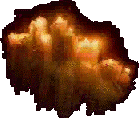
Being a reader of and a contributor to alt.music.nin, I've gotten to see many theories on just who this woman might be. I've had my own personal theory for a while now, and I remain steadfast in my belief. "Annie" is actually "Anny" from Jean-Paul Sartre's most significant novel, Le nausée (Nausea). Everyone's read this book, right? No...?
Well, when one reads Nausea, it becomes very apparent how it could've been a huge influence on the thoughts of Trent Reznor. To quote the backcover of my paperback: "Nausea is the story of Antoine Roquentin, a French writer who is horrified at his own existence." Sound familiar to anyone? Sartre, however, was a bit before Trent...Nausea was first published in 1938.
Sartre's Roquentin is a rather amazing character to watch, and the book is supposed to be his diary. In it, he records the world around him, and how it disgusts him. The book's title is a reference to the general feeling that Roquentin slowly succumbs to very often. He tries over and again to come to terms with his life, and tries to keep at his writing, but he always ends up failing. He wants some permanence in his life. He wants to be remembered. He doesn't know where he's headed.
His life's work is the biography of a historical figure, and each of the mysteries of this man's life prods him on. But, when Roquentin eventually finds himself knowing so much about Rollebon, he has no desire to go on. He suddenly grasps the concept that no one remembers the biographers, only the subjects. But he wants to be remembered himself. Again, he knows not what to do.
I think many people can relate to Roquentin's feelings of futility, and these types of emotions can be seen in the works of Reznor. But, still, who is Annie?
Anny is -- no, strike that -- was the love of Roquentin's life. But they broke up five years ago. And, suddenly, she sent him a telegram to say that she'd be in the area (not right next door, but closer than she usually is), and she wants him to come see her. Roquentin thought it'd make things better to see Anny. It doesn't. Things don't work out again. At the end, he holds her arms and brings her to him...she just shakes her head and tells him it can't happen ever again. This is how their meeting ends (Roquentin speaks first):
"Then I must leave you after finding you again."In Trent's "becoming," the lyrics are as follows:I can see her face clearly now. Suddenly it grows pale and drawn. An old woman's face, absolutely frightful; I'm sure she didn't put that one on purposely: it is there, unknown to her, or perhaps in spite of her.
"No," she says slowly, "no. You haven't found me again."
She pulls her arms away. She opens the door. The hall is sparkling with light.
Anny begins to laugh.
"Poor boy! He never has any luck. The first time he plays his part well, he gets no thanks for it. Get out."
I hear the door close behind me.
hiding backwards inside of meRoquentin was never the same after his meeting with Anny. He needed her, and she turned her back on him. He held her and wanted to be held back, but she never did.
i feel so unafraid
annie, hold a little tighter
I might just slip away
Based on Sartre's book, it's my conclusion that Trent's Annie is none other than Sartre's Anny. Any other theories I've heard (such as it being Tori Amos) just don't have enough to back them up. But I can't decide for you. Go down to your local library and pick up Nausea. See for yourself how influential a book it can be, and how Trent's music could very well have been affected by it.
